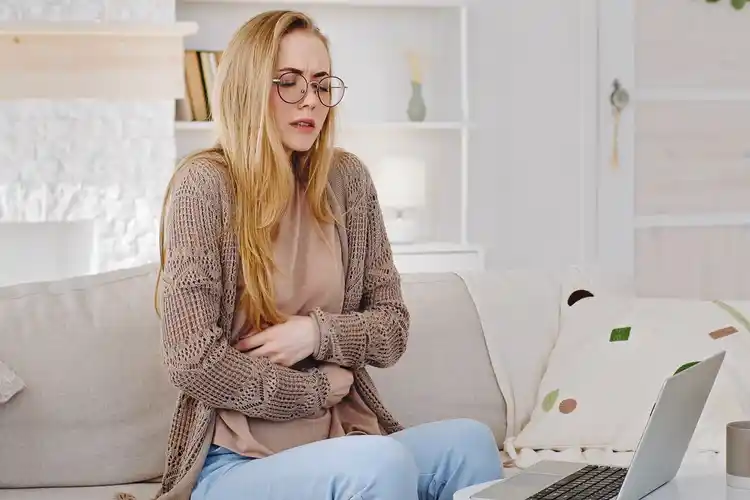The Latest Medications

Hide Video Transcript
Video Transcript
[MUSIC PLAYING]
Crohn's disease is an inflammatory bowel disease, which affects the lining of the digestive tract. About 780,000 Americans have the condition, which can have a significant impact on quality of life. While there's no cure for Crohn's disease, it can be treated with medication and, in some cases, surgery. Treatment for Crohn's disease has historically focused on treating the symptoms of the disease. But now we're starting to see new treatment focus on mucosal healing.
We had an opportunity earlier to talk about diagnosis. Now, it's time to talk about treatment. So joining me to discuss is Dr. Miguel Romero. He is currently Chair of the Department of Gastroenterology, hepatology, and Nutrition, and Chair of the Digestive Disease and Surgery Institute at Cleveland Clinic. And Dr. Russell Cohen. He's professor of Medicine and Director of the Inflammatory Bowel Disease Center at the University of Chicago.
Doctors, thanks for joining me.
Dr. Regueiro, I want to start with you, in terms of we've got a lot of advancements in treatment for Crohn's. What are the current treatment options?
There is one exception, though. Some patients with Crohn's have Crohn's right at the very bottom of their butt, where the anus and rectum meet, called perianal Crohn's disease. And in those patients, there are certain medication classes, and sometimes even a combination of a biologic and an immunomodulatory or immunosuppressant, that seemed to have the best data. So that would be an example where we would actually say, here's a disease, we'll focus with this type of medicine, as opposed to the others.
So we are starting therapies earlier, and we are using the biologics, and small molecules, earlier in our treatment, and not waiting.
When you have what are called the biologics, which are pretty much given IV or shot, or some of the new small molecules, which are given by mouth, most patients have no side effects whatsoever.
And in fact, it's interesting you brought up the COVID example. It turns out that if you have Crohn's or colitis and you're on one of these newer medicines, particularly the biologics, your outcomes with-- if you happen to catch COVID-- are much better compared to if you're on steroids, in regards to being hospitalized, being put in an intensive care unit, being put on a ventilator, or even dying. So the newer stuff actually is safer than the older stuff.
And we may have a discussion about, what do we do after surgery, because it's not a cure.
I think the other part of this is that there is better hope today than there ever was before. And I think having a hopeful message, obviously realistic, but a hopeful message for our patients, is important. We do have better therapies. Our surgeries have gotten better. The combination of surgery and medicine has gotten better.
[MUSIC PLAYING]
JOHN WHYTE
Welcome, everyone. I'm Dr. John Whyte, the Chief Medical Officer at WebMD. Crohn's disease is an inflammatory bowel disease, which affects the lining of the digestive tract. About 780,000 Americans have the condition, which can have a significant impact on quality of life. While there's no cure for Crohn's disease, it can be treated with medication and, in some cases, surgery. Treatment for Crohn's disease has historically focused on treating the symptoms of the disease. But now we're starting to see new treatment focus on mucosal healing.
We had an opportunity earlier to talk about diagnosis. Now, it's time to talk about treatment. So joining me to discuss is Dr. Miguel Romero. He is currently Chair of the Department of Gastroenterology, hepatology, and Nutrition, and Chair of the Digestive Disease and Surgery Institute at Cleveland Clinic. And Dr. Russell Cohen. He's professor of Medicine and Director of the Inflammatory Bowel Disease Center at the University of Chicago.
Doctors, thanks for joining me.
RUSSELL COHEN
Hello. MIGUEL REGUEIRO
Thank you. JOHN WHYTE
Good to see you both again. Dr. Regueiro, I want to start with you, in terms of we've got a lot of advancements in treatment for Crohn's. What are the current treatment options?
MIGUEL REGUEIRO
We still use corticosteroids, but we understand the detrimental effect of steroids, like prednisone, long term. So if we use those, we use those for a short period of induction. And our treatment has evolved through immunomodulators, such as Imuran, 6MP, and methotrexate 2, what we now consider a whole host of advanced therapies. And advanced therapies would include biologic therapies, monoclonal antibodies, and now oral small molecule. So really, targeted treatments on the immune system to control the inflammation and prevents and see the damage that occurs in the gastrointestinal tract from Crohn's. JOHN WHYTE
Dr. Cohen, does treatment vary based on the type of Crohn's disease? MIGUEL REGUEIRO
Well, that's a great question. For the most part, no. Generally, for the FDA-approved treatments that we use for Crohn's disease, the location doesn't matter. There is one exception, though. Some patients with Crohn's have Crohn's right at the very bottom of their butt, where the anus and rectum meet, called perianal Crohn's disease. And in those patients, there are certain medication classes, and sometimes even a combination of a biologic and an immunomodulatory or immunosuppressant, that seemed to have the best data. So that would be an example where we would actually say, here's a disease, we'll focus with this type of medicine, as opposed to the others.
JOHN WHYTE
Now, I'm old enough to remember, in the treatment of Crohn's disease, we really had this step approach. Do you remember that, when you had to start with certain therapies, then you'd increase dosage, then you'd try adding on a new one? What's the current management approach? Can you go straight to those small molecules or biologics? What should patients be talking about to their doctors? MIGUEL REGUEIRO
So I think that the treatment has evolved. It's no longer a step-up approach. We are much more aggressive at treating this earlier, to prevent complications, which then may lead to surgery. So the overall paradigm is what we consider a treat to target, where a new target is mucosal healing, gut healing, really not only making the patient feel better symptomatically, but healing the bowel. So we are starting therapies earlier, and we are using the biologics, and small molecules, earlier in our treatment, and not waiting.
JOHN WHYTE
Every drug has risks versus benefits. Dr. Cohen, how do you help patients think through potential side effects, in terms of we've seen it with the COVID pandemic, in terms of being immunosuppressed with certain agents, and whether that would dictate the need for a booster. So how do you talk to patients about side effects of some of the newer therapies? RUSSELL COHEN
Well, the good news for patients and providers is that most of the advanced therapies that Miguel briefly touched on actually have very, very low side effect profiles. And this is in contrast to the older therapies, which we used to have to step up through-- steroids, which have horrible side effects in many patients, especially long-term side effects; the immunosuppressants, which aren't very well tolerated in many patients for a variety of reasons, over 60% may be intolerant. When you have what are called the biologics, which are pretty much given IV or shot, or some of the new small molecules, which are given by mouth, most patients have no side effects whatsoever.
And in fact, it's interesting you brought up the COVID example. It turns out that if you have Crohn's or colitis and you're on one of these newer medicines, particularly the biologics, your outcomes with-- if you happen to catch COVID-- are much better compared to if you're on steroids, in regards to being hospitalized, being put in an intensive care unit, being put on a ventilator, or even dying. So the newer stuff actually is safer than the older stuff.
JOHN WHYTE
And Dr. Regueiro, what about the role of surgery? Some people could argue, you do it earlier on and you avoid issues, and others are like, anything but surgery. So how do you help walk patients through that process? MIGUEL REGUEIRO
I think, first of all, it's important to understand that surgery is not a failure, and we shouldn't tell our patients that we failed, or everything's failed. We need to get away from that concept. Surgery is required when there's a complication or, as I say to my patients, when the bowel damage is too far gone for medicine to work. And complications would include a stricture, a narrowing, with bowel obstruction; or a fistula, penetrating disease in the bowel, with an abscess or an internal fistula. These are absolute, in my book, indications for surgery, which is usually a resection, which restores the patient to, basically, normalcy, improves them, so that we can essentially wipe the slate clean. And we may have a discussion about, what do we do after surgery, because it's not a cure.
JOHN WHYTE
Dr. Cohen, you rattled off, along with Dr. Regueiro, a host of different types of medications that patients can try. So I have to ask you, what's left, in terms of the future of therapeutic innovations? What's the future of care for Crohn's, in two years, in five years? RUSSELL COHEN
Well, that's a great question. One of the things that, as gastroenterologists, we're very good at doing is stealing medicines from other specialties. So we actually can see pretty far ahead now as to therapies that are coming down the pike for a variety of inflammatory diseases. And we just had last week one FDA-approved therapy-- it turns out-- for ulcerative colitis. We were hoping for one for Crohn's disease. So we are anticipating, over the next few years, a number of very promising therapies, some on the market already for other conditions, and others that are not, for Crohn's disease. JOHN WHYTE
Dr. Regueiro, what do you say to a viewer who's been diagnosed with Crohn's disease, who's having some challenges? What's your message to them? MIGUEL REGUEIRO
I think it's important that we, first of all, understand what their challenges are. We know this impacts their life, their quality of life. If they're working, it impacts their work. If they're in school, it's their school relationships. This really affects the whole person. And I think we have to understand what their challenges are, and really focus on those-- the total person, not just focus on the medicine for the inflammation, but the whole person. I think the other part of this is that there is better hope today than there ever was before. And I think having a hopeful message, obviously realistic, but a hopeful message for our patients, is important. We do have better therapies. Our surgeries have gotten better. The combination of surgery and medicine has gotten better.
JOHN WHYTE
Well, Doctors, I want to thank you for taking the time today to help us think through the many treatment options that we now have for Crohn's disease, and really inspiring patients with hope, in terms of what they have available to them today and what might be on the horizon. So thank you. MIGUEL REGUEIRO
Thank you. RUSSELL COHEN
My pleasure. JOHN WHYTE
If you have questions, drop me a line. You can email me at [email protected]. Thanks for watching. [MUSIC PLAYING]
